
Get up to 3 quotes by filling in only 1 quick form

Compare quotes and find yourself the best deal

Increase the value of your home by installing a new boiler
- Householdquotes.co.uk
- New Boiler Costs
New Boiler Costs in 2024: Prices & Installation in the UK

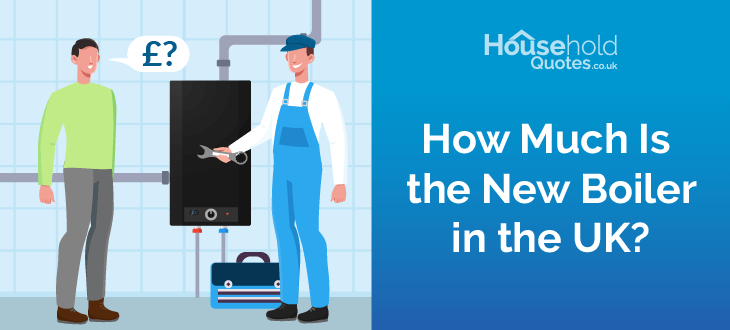
As the chilly winds of the upcoming winter descend upon the UK, it’s time to cosy up to the idea of a new boiler. Getting a new boiler in the UK is a solid investment, so some homeowners seek ways to balance both their comfort and financial well-being.
While the new boiler and installation cost might not equal your average grocery bills, it definitely carries far-reaching benefits for your energy bills.
In this article, we’ll navigate the ever-changing landscape of boiler prices in the UK, boiler replacement cost, and which boiler grants are available for UK homeowners.
The best way to find a bargain among all the boiler prices is to compare boiler quotes from heating experts. However, finding an installer you can trust can become a real pain in the neck with all the googling, calling and vetting. We bet it’s not your dream activity for using up your Sunday afternoon.
Thankfully, Household Quotes can do the legwork for you. All you have to do is fill in our 30-second form and we’ll connect you with up to 3 vetted heating engineers in your area. Compare their free quotes to find the best solution for your home. It’s completely free and non-binding. Click below to begin!
- Quotes from local installers
- Payment by finance available
- Save up to £975
It only takes 30 seconds

- How much is a new boiler? Boiler prices in the UK
- Combi boiler cost
- System boiler cost
- Conventional boiler cost
- Electric boiler cost
- Installation costs of a new boiler
- What influences installation costs
- Cost of replacing your old boiler with a new boiler
- Average boiler cost per boiler manufacturer in the UK
- Are there boiler grants that influence boiler costs available now?
- Advantages of getting a new boiler in the UK
- What is the payback period of a new boiler?
- Get new boiler deals for your UK household
- FAQ
How much is a new boiler? Boiler prices in the UK
The new boiler cost in the UK varies widely, spanning from £500 to £3,000, depending on the boiler type and manufacturer. This also depends on your household size, with 3 resident households being the most common in the UK. The best boiler for a 3 bed house will probably cost £1,100 to £2,000.
This installation cost encompasses the labour hours of the engineer and the intricacy of the installation process. Several factors, such as the boiler brand and your geographical location, can influence the final cost of installing a new boiler in your household.
| New boiler type | Price range | Average (with installation) |
|---|---|---|
| Combi | £500-£3,000 | £2,750 |
| Conventional | £660-£2,750 | £2,955 |
| System | £580-£2,500 | £2,790 |
| Electric | £590-£2,500 | £2,790 |
These costs are estimates. Get a local installer QUOTE now!
Depending on the size of your property, you’ll need a specific boiler type. Thus, no matter how much you’d prefer a compact combi boiler for your 2000 sq ft house, it just won’t be able to heat it!
This means the bigger your property is, the higher your boiler investment will be.
Learn about combi boiler flow rate in our helpful guide.
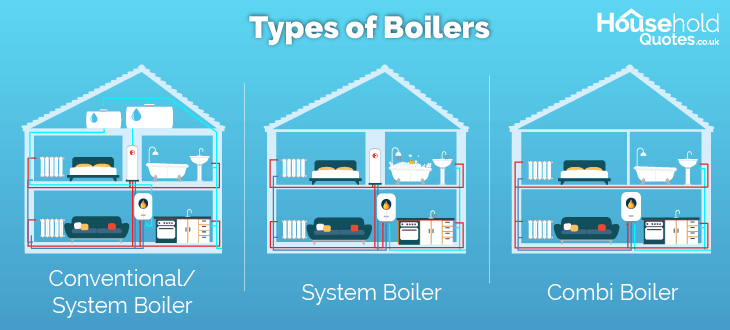
Moreover, as the UK targets to reduce carbon emissions by 2050 within its Net Zero programme, boiler manufacturers are set to introduce a 20% hydrogen blend into the UK mains supply by that time.
This way, boilers will run on a mixture of hydrogen and natural gas and gradually reduce carbon emissions from heating homes and buildings. Thus, most new boiler installations in the UK will be this type of boiler.
Discover the best gas boilers for your home or let us find you an installer who can help.
New combi boiler cost
Combi boilers, or combination boilers, are the most popular with UK homeowners. They are energy-efficient, providing both heating and hot water on demand without the need for a separate storage tank. A small combi boiler can be an ideal fit for a home with up to two bathrooms. Check out our dedicated page to help find the best combi boilers on the market today.
The average combi boiler cost is as follows:
| New boiler type | Price range | Average, inc. installation |
|---|---|---|
| Combi | £500-£3,000 | £2,750 |
- Energy efficiency.
- Space-saving.
- Instant hot water supply.
- Cost-effectiveness.
- Limited hot water supply.
- Unsuitable for weak mains water pressure.
- Unsuitable for larger homes.
New system boiler cost
System boilers are another favourite, known for their simplicity and ease of installation. They work with a separate hot water cylinder and suit larger households with higher hot water demands. If you’re unsure which boiler is best for you, compare a combi boiler vs system boiler to get the right size for your needs.
The manufacturer, model, and fuel play a major role in choosing your system boiler. Yet, the size of your property, your home’s energy needs, the efficiency rating, and the warranty length of your new boiler contribute to the system boiler cost too.
| New boiler type | Price range | Average, inc. installation |
|---|---|---|
| System | £580-£2,500 | £2,790 |
- Pressurised hot water supply.
- Ideal for larger homes.
- Space-saving design.
- Don’t need a water tank.
- Compatibility with solar panels.
- Delayed hot water availability.
- Heat loss.
- Complex and costly installation.
- Unsuitable for weak mains water pressure.
New conventional boiler cost
A conventional boiler consists of a feed and expansion tank and a cold water cistern in the loft or attic. A hot water storage cylinder is required as well, usually stored in an airing cupboard. The total conventional boiler cost depends on the:
- Brand
- Model
- Warranty
- Installation cost
- Property size
| New boiler type | Price range | Average, inc. installation |
|---|---|---|
| Conventional | £660-£2,750 | £2,955 |
- Suitable for low-pressure areas.
- Multi-outlet hot water delivery.
- Solar panel compatibility.
- Cost-effective.
- Space requirements.
- Delayed hot water supply.
- Heat loss.
- Installation complexity and cost.
New electric boiler cost
Electric boilers are perfect for smaller-sized homes that have less demand for hot water and limited storage space.
Electric boiler costs can range from £590 and £2,500 but the running costs, however, are higher as electricity is more expensive than gas. This can lead to higher running costs and energy bills.
| New boiler type | Price range | Average, inc. installation |
|---|---|---|
| Electric | £590-£2,500 | £2,790 |
It’s possible to find combi, conventional and system boilers that run on electricity instead of gas or oil. This feature makes electric boilers a favoured choice for homes that are not connected to the gas grid. Furthermore, the top-performing electric boilers boast efficiency ratings nearing 100%, allowing you to maximise your energy usage.
This is why electric boilers are commonly considered an environmentally friendly boiler option provided the electricity fueling the boiler comes from renewable resources. They operate without emitting carbon emissions or harmful gases.
However, it’s worth noting that most electricity in the UK is primarily generated from burning natural gas. The escalating cost of natural gas is one of the contributing factors to the relatively high operational expenses associated with electric boilers and electric combi boilers. You can get a deeper look into the topic from our electric boiler vs gas boiler comparison page.
- Highly efficient.
- Small in size.
- Potentially environmentally friendly.
- Higher running costs
- Don’t suit larger households
- No hot water during power cuts
Electric heating may potentially become the only game in town when it comes to newly-built homes. The gas boiler ban for new homes aims to phase them out in favour of electricity after 2025 (although this may be subject to change). Read our page about heat pumps vs gas boilers to learn more.
Installation costs of a new boiler
The new boiler installation cost in the UK generally falls within the bracket of £1,500 to £2,955. The variability primarily stems from factors like boiler type, complexity of installation, additional materials, or the brand you choose.
This cost also includes the labour hours of the engineer and factors in the complexity of the installation.
| New boiler cost | Installation cost | Total |
|---|---|---|
| £500-£3,000 | £650-£2,500 | £1,150-£5,500 |
When installing a new boiler, your project may involve the removal of old units and the addition of new components. This is especially likely during conventional or back boiler replacements, which include the most components. Additional expenditures to consider may include:
- System power flush: £50 to £150
- Magnetic filter: £100 to £150
- Thermostatic heat controls: £70 to £650
- New boiler flue pipe: £50 to £150
Also, the installation price can be affected by the rates of a particular installer or a location where you prefer to see your new boiler.
Local installers can provide the best boiler deals. However, independent searches of trusted installers can take hours if not days. Moreover, that’s not a bulletproof way to find a certified company with the proper expertise for the best price.
Fortunately, there’s a way to avoid all this stress and save your precious time. Just fill out our quick form and we’ll provide you with up to 3 quotes from local Gas Safe registered boiler installers. Compare their prices without having to accept any offers. To start, click the button below for free, no-obligation quotes.
- Quotes from local installers
- Payment by finance available
- Save up to £975
It only takes 30 seconds

What influences installation costs of a new boiler
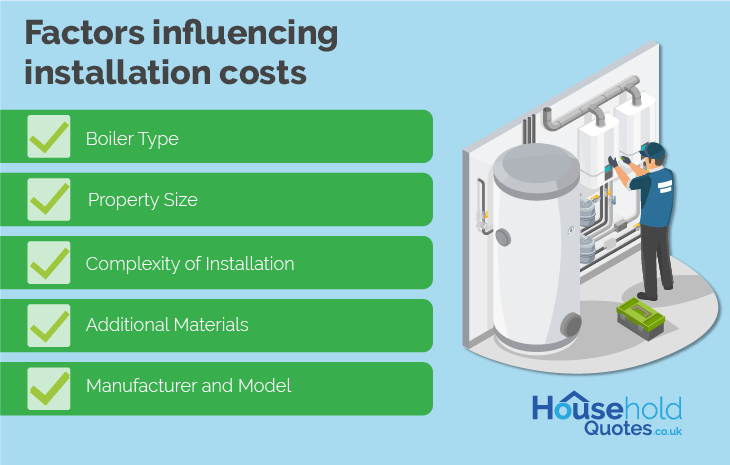
Factors like the specific site conditions, including geographic location, site accessibility, and the intended boiler placement, can exert an impact on the expenses associated with boiler installation. There are other major factors as well:
- Variations in boiler type. The expense tied to the boiler itself is contingent upon its fuel source and size. For instance, gas boiler installations typically tally up to around £1,695, whereas oil boilers may range from £1,500 to £3,000 in cost, with new oil boiler replacement being cheaper than new installations.
- Transitioning between boiler types. If you opt to switch from one boiler style to another, like changing from conventional boiler to combi, the expenditure is likely to be higher compared to replacing your current boiler with the same type. This is because your heating engineer may need to invest additional labour to ensure proper setup.
- Residence dimensions. The size of your dwelling and the requisite number of radiators and circulation valves can significantly impact installation costs.
- Installation complexity. Installation intricacy, including the number of radiators and circulation valves, also plays a pivotal role in determining installation costs.
- Boiler make and model. The choice of boiler make and model can further influence the overall installation expense.
- Supplementary expenses. Additional considerations encompass labour and fitting installation costs, permits, and inspection fees.
Installation permits can entail expenses ranging from £50 to £300, with the higher end typically linked to new construction projects. If inspection fees are required, they can increase the total cost as well.
It’s worth noting that labour and material rates exhibit regional disparities throughout the UK, with major urban centres like London often commanding higher labour costs for boiler installations compared to other areas.
Cost of replacing your old boiler with a new boiler
The expense associated with replacing your old boiler with a new one in the UK can fluctuate based on the boiler type, property size, and installation complexity.
On average, the boiler replacement cost typically ranges between £1,150 and £5,500. Nevertheless, the boiler installation cost for a new boiler can fluctuate, with a typical range of £1,500 to £2,955.
Average new boiler cost per boiler manufacturer in the UK
The typical expense associated with replacing a new boiler generally ranges from £1,150 to £5,500. This encompasses the cost of a new boiler, typically falling between £500 and £3,000, along with the average installation cost, which typically ranges from £1,500 to £2,955.
The prices largely depend on particular manufacturers. For example, the Baxi boilers are cheaper boilers than Vaillant boilers:
| Brand | Combi boiler prices | Conventional Boiler Prices | System Boiler Prices |
|---|---|---|---|
| Alpha | £690 – £1,033 | £710 – £810 | £788 – £1246 |
| Baxi | £610 – £1,307 | £695 – £991 | £711 – £1,032 |
| Ideal | £847 – £1,354 | £712 – £2,796 | £874 – £1,352 |
| Worcester Bosch | £730 – £2,475 | £814 – £2,300 | £899 – £3,837 |
| Vaillant | £907 – £1,703 | £792 – £1,533 | £894 – £2,700 |
| Viessmann | £916 – £3,520 | £1,100 – £1,557 | £995 – £1,650 |
These costs are estimates. Get a local installer QUOTE now!
Are there boiler grants that influence boiler costs available now?
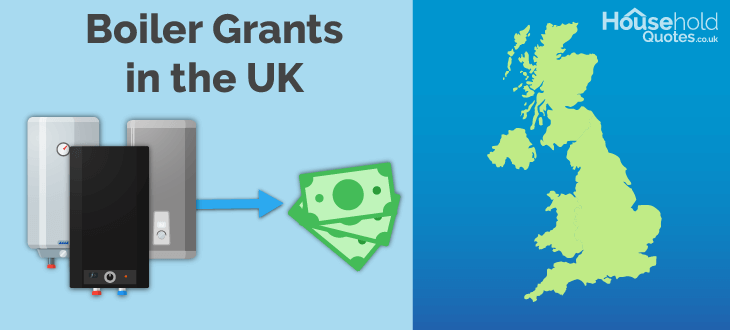
Homeowners and tenants looking to enhance the energy efficiency of their homes and save on costs have the opportunity to benefit from various boiler grants.
The Energy Company Obligation (ECO) scheme, designed to promote energy efficiency, offers grants to help households cut their central heating expenses and boost their home’s energy efficiency.
You can apply for this grant under the ECO4 scheme. It’s worth noting that this scheme will run up until 31 March 2026.
In Northern Ireland, the Boiler Replacement Scheme was exclusively applicable to homeowners or tenants with boilers that were at least 15 years old and operating inefficiently. This scheme closed in September 2023.
Consider consulting an experienced boiler installer to find out whether you qualify for any grants.
Advantages of getting a new boiler in the UK
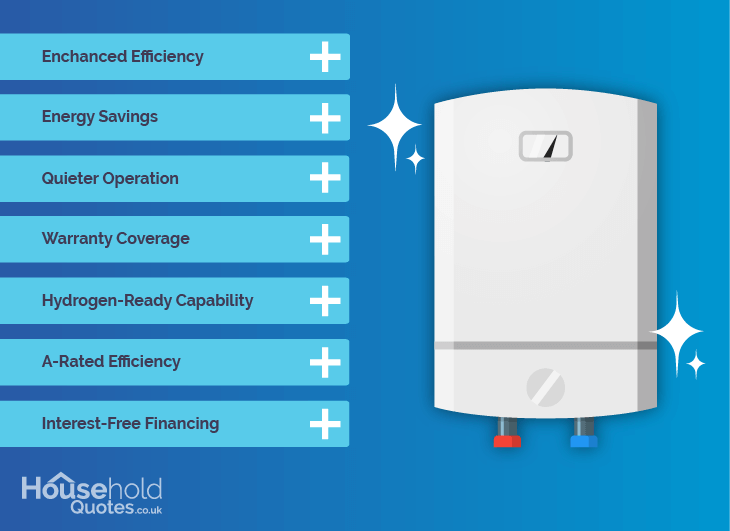
Opting for a new boiler installation can result in enhanced efficiency, reduced energy expenses, and an increased level of comfort in your home.
- Enhanced efficiency. Upgrading to a new boiler can significantly enhance efficiency compared to older models, resulting in potential energy bill savings. Additionally, if you find your boiler leaking water, it could be costing you in terms of water bills.
- Energy savings. Replacing an outdated, inefficient boiler with a new one can lead to substantial energy cost reductions.
- Quieter operation. Newer boiler models generally operate with less noise compared to their older counterparts.
- Warranty coverage. Many new boilers come with warranties and guarantees, offering peace of mind and protection against unexpected repair expenses.
- Hydrogen-ready capability. New boilers are designed to be hydrogen blend-ready, aligning with the UK’s transition to a low-carbon economy.
- A-rated efficiency. Numerous new boilers are rated ‘A’ for efficiency, indicating their high energy efficiency and potential for reducing your carbon footprint.
- Interest-free financing. Some companies provide interest-free financing options for new boiler installations, making the upfront cost more manageable.
What is the payback period of a new boiler?
After you have the new boiler and installation cost settled, you might wonder when your investment will break even. In a similar fashion to the boiler running costs, your savings will largely depend on the boiler itself, your energy consumption habits, and current energy prices.
As of October 2023, the new energy price for electricity is set to £0.27/kWh and £0.07/kWh for gas (with daily standing charges of £0.53 and £0.30 respectively).
This way, how much you save with a new boiler depends on its efficiency, your electricity usage, and energy prices. A Gas Safe registered engineer can estimate the payback period by looking into your particular boiler type, electricity consumption, and housing situation.
Get new boiler deals for your UK household
If you’re looking for a new boiler, we highly recommend comparing quotes. This will also give you peace of mind that you’re getting the most competitive price.
Rather than spending hours trying to hunt local installers yourself, let us take care of that for you. Simply complete our online boiler quotes form and you’ll have up to 3 installers getting in touch to give you a quote in no time. Compare these quotes with no pressure to place any orders. Click below to get started.
- Quotes from local installers
- Payment by finance available
- Save up to £975
It only takes 30 seconds

FAQ
Since conventional or system boilers suit larger households, on average they cost £660–£2,750 and £580–£2,500 respectively.
The prices depend on the boiler type and manufacturer. The typical price range is £500-£3,000 followed by installation costs of between £650–£2,500.
The prices stretch anywhere between £500-£3,000 depending on the boiler type and manufacturer. Consider comparing quotes from several heating engineers to find the price that suits you.
Yes, new boilers are worth the investment. They are generally more energy-efficient and can potentially save you money on energy bills.
Yes, a new boiler can save money as most new boilers are energy-efficient and use as little electricity as possible. However, the savings depend on current energy prices and your home’s heating requirements.
- How much is a new boiler? Boiler prices in the UK
- Combi boiler cost
- System boiler cost
- Conventional boiler cost
- Electric boiler cost
- Installation costs of a new boiler
- What influences installation costs
- Cost of replacing your old boiler with a new boiler
- Average boiler cost per boiler manufacturer in the UK
- Are there boiler grants that influence boiler costs available now?
- Advantages of getting a new boiler in the UK
- What is the payback period of a new boiler?
- Get new boiler deals for your UK household
- FAQ
